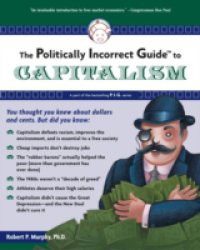Most commonly accepted economic "facts" are wrong Here's the unvarnished, politically incorrect truth. The liberal media and propagandists masquerading as educators have filled the world--and deformed public policy--with politically correct errors about capitalism and economics in general. In The Politically Incorrect Guide(tm) to Capitalism, myth-busting professor Robert P. Murphy, a scholar and frequent speaker at the Ludwig von Mises Institute, cuts through all their nonsense, shattering liberal myths and fashionable socialist cliches to set the record straight. Murphy starts with a basic explanation of what capitalism really is, and then dives fearlessly into hot topics like:* Outsourcing (why it's good for Americans) and zoning restrictions (why they're not)* Why central planning has never worked and never will* How prices operate in a free market (and why socialist schemes like rent control always backfire)* How labor unions actually hurt workers more than they help them* Why increasing the minimum wage is always a bad idea* Why the free market is the best guard against racism* How capitalism will save the environment--and why Communist countries were the most polluted on earth* Raising taxes: why it is never "responsible"* Why no genuine advocate for the downtrodden could endorse the dehumanizing Welfare State* The single biggest myth underlying the public's support for government regulation of business* Antitrust suits: usually filed by firms that lose in free competition* How tariffs and other restrictions "protect" privileged workers but make other Americans poorer* The IMF and World Bank: why they don't help poor countries* Plus: Are you a capitalist pig? Take the quiz and find out! Breezy, witty, but always clear, precise, and elegantly reasoned, The Politically Incorrect Guide(tm) to Capitalism is a solid and entertaining guide to free market economics. With his twelve-step plan for understanding the free market, Murphy shows why conservatives should resist attempts to socialize America and fight spiritedly for the free market.

